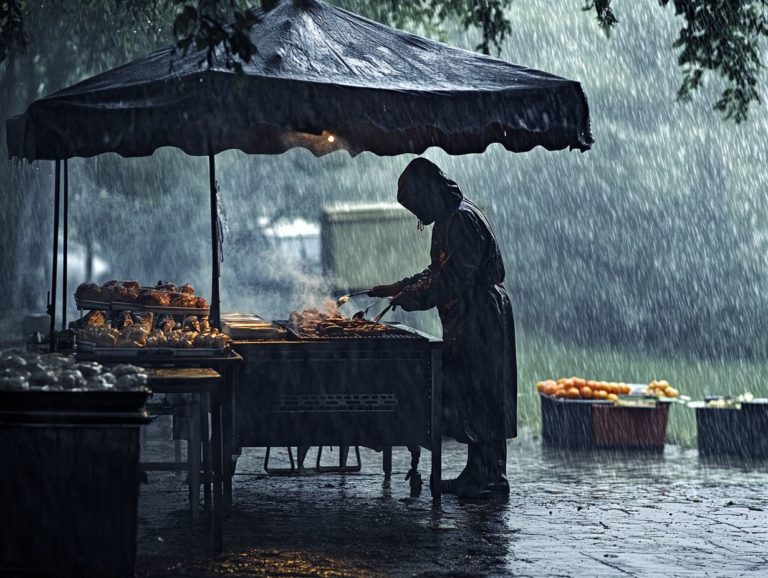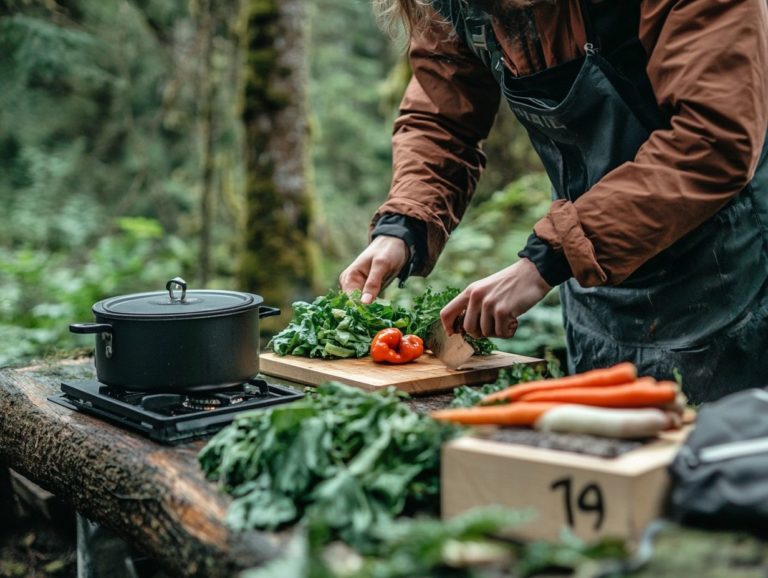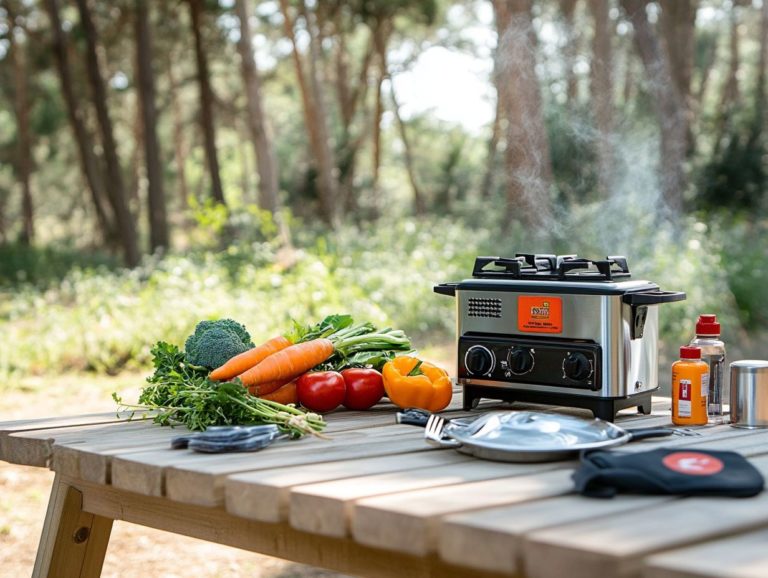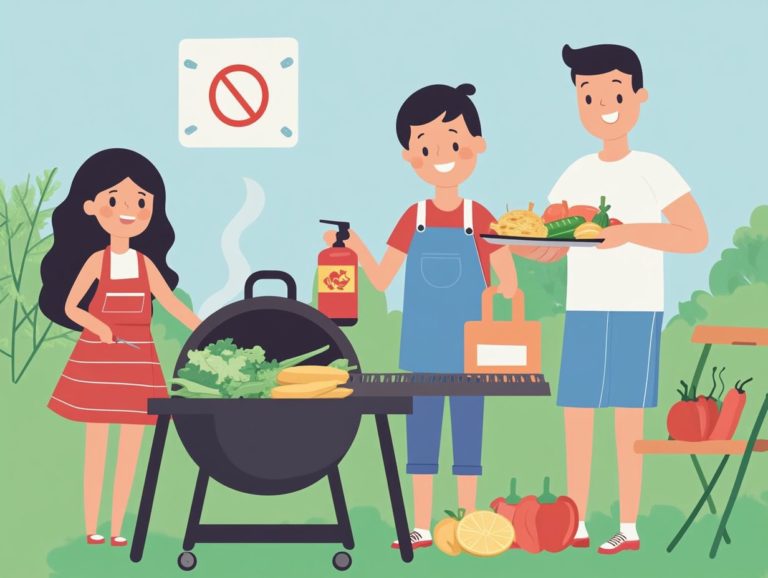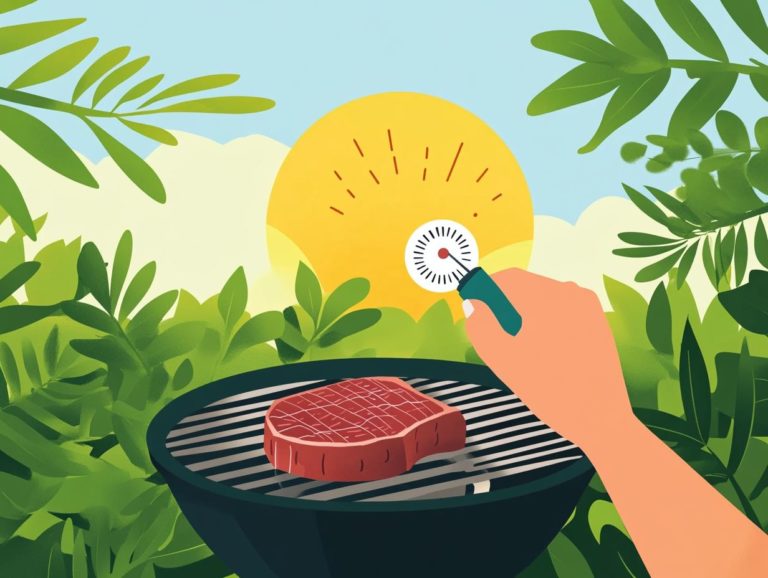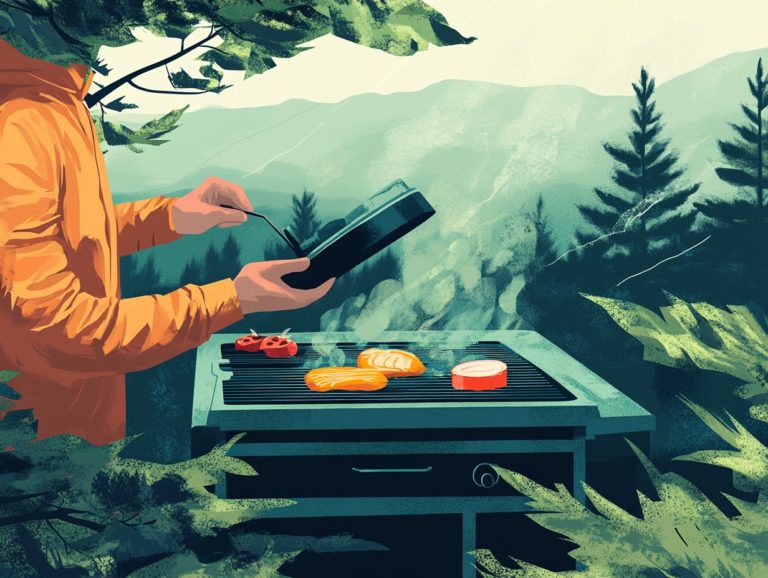How to Safely Use a Grill in Your Backyard
Grilling is one of the most delightful summer activities! It effortlessly brings friends and family together for mouthwatering meals and cherished memories, all while emphasizing important grilling safety tips.
While mastering your favorite recipes is thrilling, ensuring your grilling experience is safe is equally crucial. This guide delves into essential grilling safety basics, from recognizing fire hazards to maintaining your grill properly, ensuring you can enjoy your outdoor cooking experiences.
You’ll learn how to select the perfect grill and set it up securely while keeping in mind the necessary safety measures. We ll also cover emergency preparedness, including the importance of having a fire extinguisher within reach, to ensure your outdoor gatherings remain worry-free.
Grab your apron and get ready to fire up the grill like a pro!
Contents
- Key Takeaways:
- Grilling Safety Basics
- Choosing the Right Grill for Your Backyard
- Setting Up Your Grill for Safe Use
- Safe Grilling Practices
- Dealing with Emergencies
- Frequently Asked Questions
- What safety precautions should I take when using a grill in my backyard?
- Should I use lighter fluid to start my grill?
- Are there any specific types of grill that are safer to use in a backyard?
- How can I prevent foodborne illnesses when grilling in my backyard?
- What should I do if a grease fire occurs while using my grill?
- Never Leave Your Grill Unattended!
Key Takeaways:
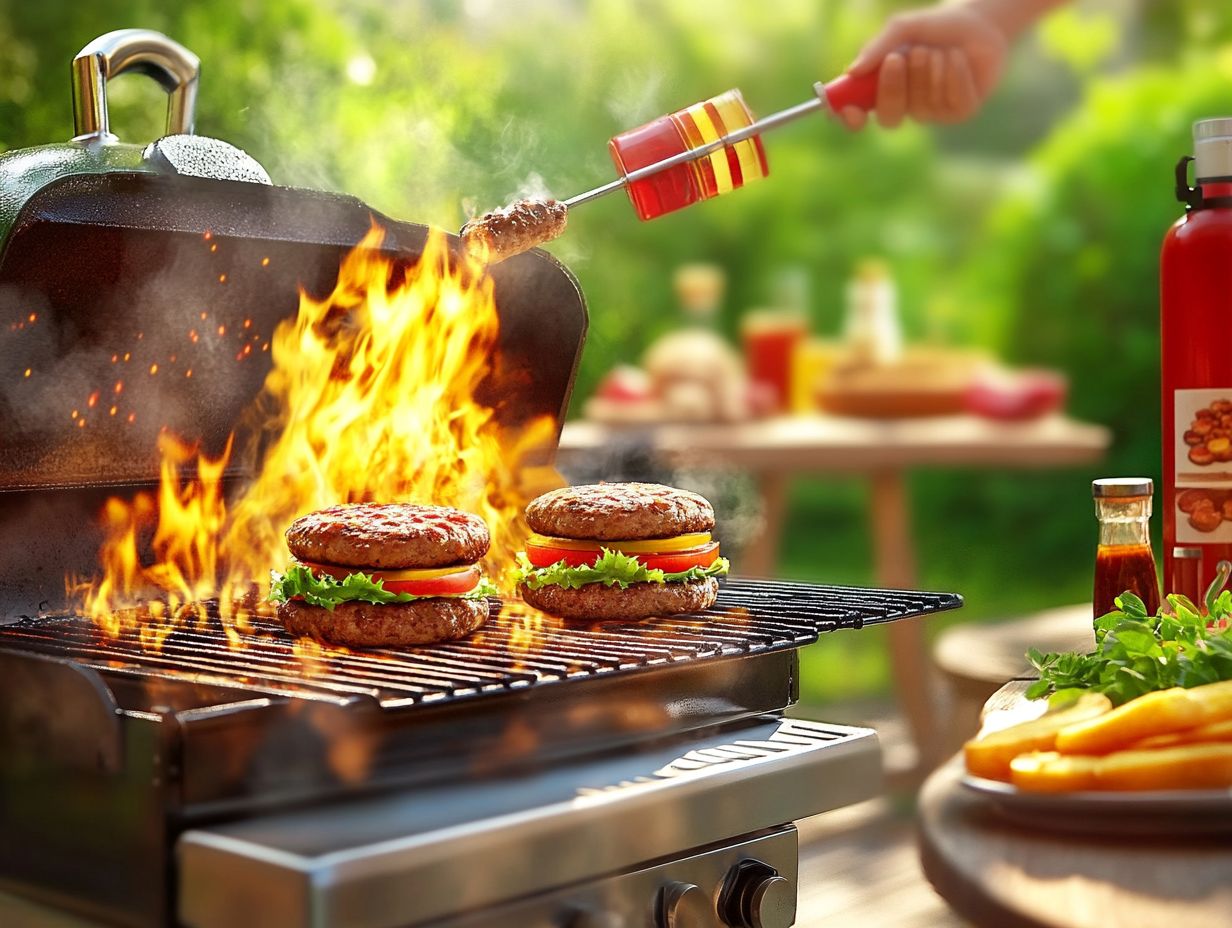
- Always follow basic grilling safety guidelines, such as keeping a fire extinguisher nearby and inspecting your grill regularly, to prevent accidents and injuries.
- Choose the right type of grill for your backyard and make sure to set it up in a safe location with proper ventilation and distance from flammable items.
- Practicing safe grilling techniques, including proper preparation and cleanup, can help prevent emergencies and ensure a successful and enjoyable grilling experience.
Grilling Safety Basics
Grilling safety basics are crucial for anyone eager to savor a barbecue at home with family and friends. Failing to observe these practices can lead to dangerous situations, including fire hazards, equipment failures, and even injuries. To ensure a safe experience, especially in challenging conditions, consider following tips for safe outdoor cooking in windy conditions. Always be aware of your clothing and surroundings to avoid any flammable incidents.
By understanding these basics, you not only elevate your grilling experience but also ensure that everyone can relish delicious food without the looming threat of accidents related to unattended grills.
From choosing the right grill to following essential safety tips like keeping flammable materials well away from heat sources and having a spray bottle of water handy, key safety tips for using portable grills enable you to create a secure and enjoyable outdoor cooking environment.
Understanding Fire Hazards and Precautions
Understanding fire hazards and necessary precautions is essential for anyone who enjoys grilling, whether it s propane, gas, or charcoal. Knowing how to deal with grease fires is crucial as each type of grill brings its own set of risks that require careful management to ensure a safe outdoor cooking experience.
Neglecting safety measures can lead to serious accidents, including uncontrolled fires and painful burn injuries. As a grill owner, you should always prioritize placing your grill away from flammable surfaces, overhanging branches, and structures like your garage or deck. Additionally, consider learning how to secure your outdoor cooking setup for added safety.
Regularly inspecting hoses and connections for leaks is crucial for gas grills, while charcoal enthusiasts must exercise caution with lighter fluids to prevent dangerous flare-ups that can cause serious fire hazards.
Supervision during cooking isn t just a recommendation; it s a must. Never leave your grill unattended, as sparks can ignite nearby materials, including flammable clothing, in the blink of an eye.
Keeping your grill clean is also key to minimizing grease buildup and ensuring that it operates safely, preventing hazardous flare-ups that could ruin your outdoor gatherings.
Proper Grill Maintenance and Inspection
Proper grill maintenance and inspection are essential practices for grilling enthusiasts. Embracing these steps ensures a safe and enjoyable barbecue experience. Regular upkeep helps your equipment operate safely and efficiently, minimizing fire hazards while extending the lifespan of your grill and preventing leaks, whether it s propane, gas, or charcoal.
Routine cleaning of the grates is crucial. It prevents food residue buildup, including grease, that can lead to unpleasant flavors and smoke during cooking. Inspecting propane grills for leaks is vital. A simple soap and water solution can reveal hidden gas leaks that pose serious risks. If you own a charcoal grill, pay close attention to the air vents and ash removal to maintain optimal airflow, which is key for a steady burn.
By dedicating time to these maintenance tasks, you enhance your grill’s performance and create a safer cooking environment. This allows you to enjoy worry-free outdoor gatherings while adhering to the safety guidelines set forth by the National Fire Protection Association and the Consumer Product Safety Commission. Make the most of your grilling experience!
Choosing the Right Grill for Your Backyard
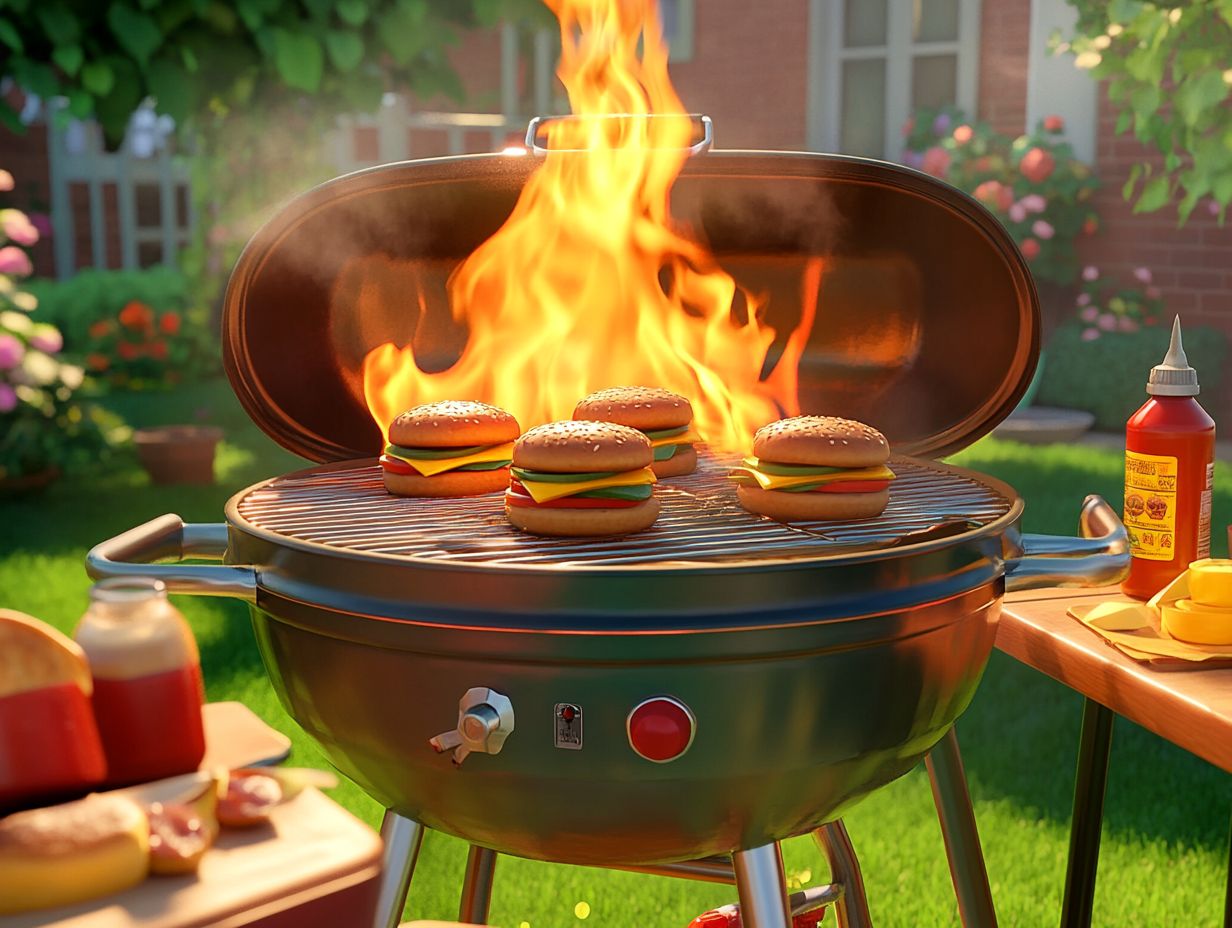
Selecting the perfect grill for your backyard goes beyond personal preference. You need to consider different factors, including your cooking style, safety features, and maintenance needs. This ensures a safe and enjoyable barbecue experience, whether you choose a propane, gas, or charcoal grill.
Types of Grills and Their Features
There s a world of grills, each boasting unique features and benefits. When choosing the right option for your outdoor space, think about your cooking needs, safety requirements, and whether you have enough storage for your grill supplies.
If you lean towards a propane grill, you ll appreciate the quick start-up times and precise temperature control. Just keep in mind the need for careful fuel storage to avoid leaks, ensuring a customized cooking experience. Also, consider fuel storage, potential gas leaks, and the importance of having a fire extinguisher for safety.
Gas grills often feature user-friendly designs, minimal clean-up, and essential safety features like automatic shut-off valves, which automatically stop gas flow when the grill is turned off. While they are practical, they may not deliver the intense smoky flavor cherished by barbecue enthusiasts who prefer traditional charcoal grills.
Charcoal grills are adored for the rich, complex flavors they impart to meats. However, they can be trickier to ignite and may take longer to reach optimal cooking temperatures. By understanding these distinctions, you can make an informed choice that aligns with your culinary preferences while prioritizing safety and ease of use, ensuring memorable moments with family and friends.
Setting Up Your Grill for Safe Use
Setting up your grill for safe use is an essential step that requires careful consideration of your grilling location. Ensure proper ventilation and adhere to safety guidelines, including having a water source nearby. For more information, refer to these essential tips for outdoor cooking. Being careful helps ensure your outdoor cooking is safe and enjoyable, especially when grilling with propane, gas, or charcoal.
Remember to regularly check your grill and share your grilling experiences with friends for even more fun!
Location, Ventilation, and Other Considerations
When you set up your grill, factors like location and ventilation are essential for ensuring both safety and efficiency. Keeping flammable materials at a safe distance helps prevent accidents or fire hazards.
Choosing the right spot, far from buildings, overhangs, and trees, is crucial. This helps prevent potential fire hazards, such as grease fires, and ensures that there’s ample space for smoke to disperse freely. A well-ventilated area promotes better airflow, which is vital for maintaining temperature control during cooking.
Placing the grill near a water source is wise. It allows for quick action in extinguishing flames if needed during your outdoor cooking.
Keep a fire extinguisher nearby. This helps you act quickly in case of an emergency, especially if there are any leaks or flare-ups. By taking these factors into account, you can craft an enjoyable and safe grilling experience.
Safe Grilling Practices
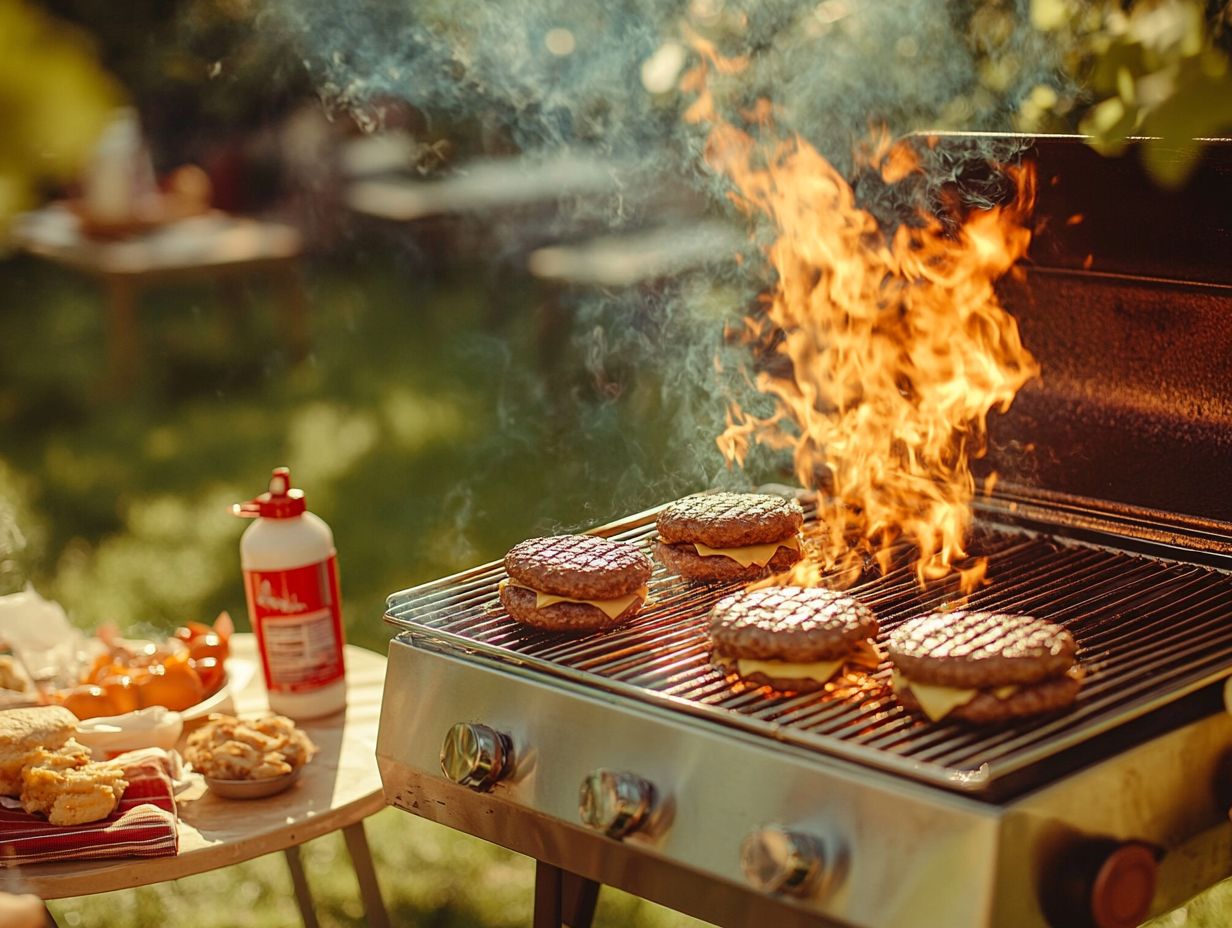
Embracing safe grilling practices is paramount for ensuring a delightful barbecue experience for everyone. This involves careful preparation, refined cooking techniques, and thorough cleanup procedures. To further enhance safety during your outdoor grilling adventures, consider properly using propane for outdoor cooking safely. These steps aim to minimize risks, such as grease fires, and promote a safer cooking environment.
Preparation, Cooking, and Cleanup Tips
Preparation, cooking, and cleanup are essential components of safe grilling. Pay close attention to detail to ensure proper food handling and a well-maintained grilling area.
As you embark on your grilling adventure, consider marinating your meats to amplify their flavor. Always remember to wear appropriate clothing to avoid grease splashes. A thoughtful seasoning before cooking adds depth to your dishes.
It s crucial to adhere to safe cooking temperatures. Aim for a temperature of 165 F for chicken and 145 F for pork to effectively eliminate harmful bacteria. This ensures everyone’s safety.
After cooking, clean up thoroughly. This helps prevent fire hazards. Ensure the area is free from flammable materials like paper, old grease, and other potential threats.
A tidy workspace not only fosters safety but also elevates your overall grilling experience. Enjoy delightful moments shared with friends and family during your backyard barbecue.
Dealing with Emergencies
Navigating emergencies while grilling is an inevitable part of outdoor cooking. Know how to handle grease fires and manage accidents effectively. Having a plan in place can transform your barbecue into a safe and enjoyable experience for the entire family.
With the right knowledge, ensure that your time spent grilling remains a cherished memory by following safety tips for cooking with open flames outdoors, not a hazardous ordeal.
Handling Accidents and Fire Hazards
Handling accidents and fire hazards is essential for any grilling enthusiast. Being well-prepared with the right knowledge and tools like a fire extinguisher and a spray bottle with water can greatly reduce the risk of incidents.
Understanding the specific causes of fires, particularly grease fires (fires caused by cooking oils), can make a difference. If flames erupt from a grease spill, it s crucial to act swiftly. Turn off the heat source and cover the flames with a metal lid. If it s safe, use baking soda to smother the fire.
Regarding equipment failures, keep your tools in good shape and have backup plans ready. Beyond having extinguishers available, wearing protective gear and establishing a safe cooking zone are vital strategies that enhance safety while you enjoy your grilling experience.
Get your grill ready and invite your friends for a safe and fun barbecue today!
Frequently Asked Questions
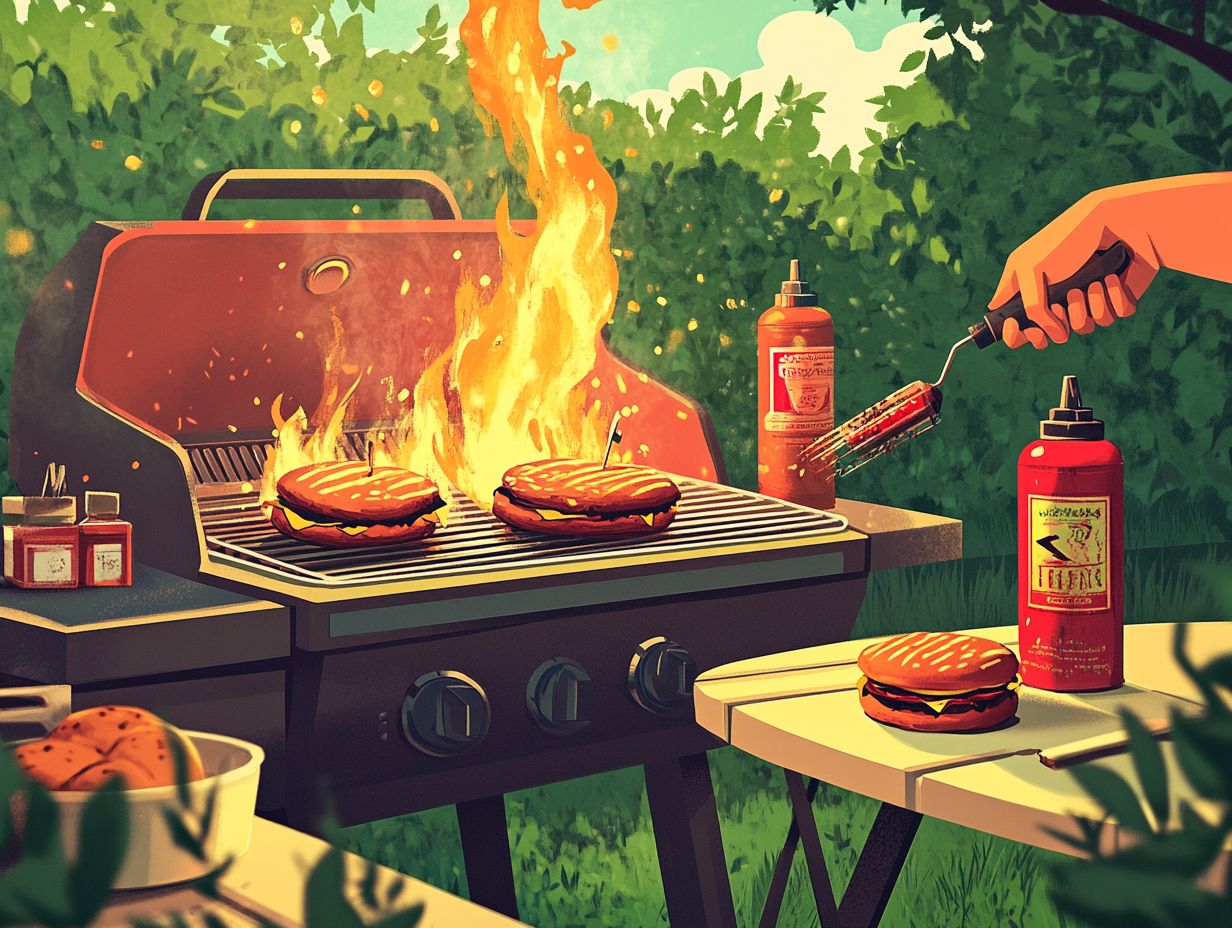
What safety precautions should I take when using a grill in my backyard?
Keep a safe distance between the grill and any flammable objects. Have a fire extinguisher on hand.
Properly clean and maintain your grill to avoid accidents. Additionally, check out tips for keeping food safe on the grill for more essential safety guidelines.
Should I use lighter fluid to start my grill?
No, it is not recommended to use lighter fluid as it can cause flare-ups and potentially harm the person operating the grill. Instead, use a chimney starter or wood chips to safely start your grill.
Are there any specific types of grill that are safer to use in a backyard?
Gas grills are generally considered safer than charcoal grills, as they do not involve open flames. However, with proper precautions, both types of grills can be used safely in a backyard setting.
How can I prevent foodborne illnesses when grilling in my backyard?
Make sure to cook meats to safe cooking temperatures. Avoid mixing raw and cooked foods by using separate utensils and plates.
Wash your hands frequently and keep all food stored at safe temperatures.
What should I do if a grease fire occurs while using my grill?
If a grease fire occurs, do not try to put it out with water. Instead, turn off the grill and close the lid to cut off the oxygen supply.
You can also use a fire extinguisher or cover the flames with baking soda or sand.
Never Leave Your Grill Unattended!
It’s crucial to stay near your grill while cooking, especially with children or pets around. Always keep an eye on it and never leave it running when you’re not there!
Grill safely and enjoy your backyard barbecues!

